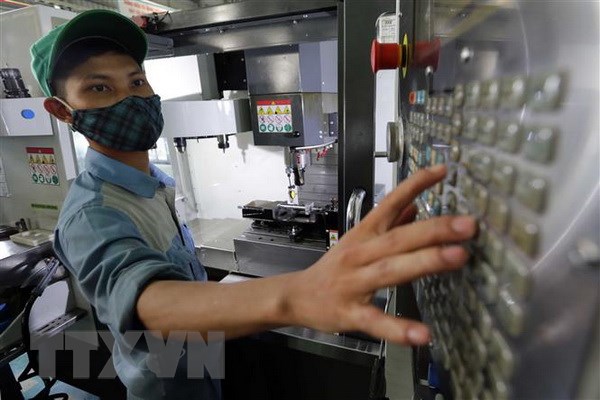 Society
Society

Training the workforce and helping reskill low-skilled workers are important tasks in preparing for the rapid technological development during the fourth industrial revolution, experts have said.

|
| More focus on workforce training is needed amid the fourth industrial revolution, a conference hears in HCM City on October 30. - VNA Photo Trần Việt |
HCM CITY — Training the workforce and helping reskill low-skilled workers are important tasks in preparing for the rapid technological development during the Fourth Industrial Revolution, experts have said.
Trần Lê Thanh Trúc, director of the Centre for Forecasting Manpower Needs and Labour Market Information HCM City, told a conference in HCM City on Wednesday that the industrial revolution could bring about more job opportunities from new business models in a digital era, and only low-skill, repetitive jobs would be displaced.
Work efficiency would also be higher in manufacturing industries due to new technologies, which could help increase workers' earnings, she said.
A more skilled, high-quality workforce would be required due to changes in how production is carried out with the aid of technologies, and more and more of the city's workforce are being trained and educated, she said.
But she admitted that adopting modern, automated technologies and artificial intelligence, and subsequently switching from cheap, low-skilled labour to skilled labour could negatively impact the traditional labour market.
Many workers in the city still lack skills and there is a serious lack of high-skilled ones, so the workforce as a whole might not yet be ready for rapid changes in technology.
Several areas are expected to develop quickly in future and attract a large proportion of the workforce, including automation and technologies such as 3D printing, robotics and food production.
Graphic, fashion and architecture design will also see more interest in addition to business management, marketing and finance, and services such as tourism and logistics.
Newer, more specialised and practical job opportunities will also increase as a result of newer trends and demands such as game development, web security, risk management, information system management, and medical research.
Trần Phúc Hồng, deputy general director of TMA Solutions, a software outsourcing company, said Việt Nam has an opportunity to be ranked relatively highly on the global hi-tech scene.
Việt Nam has a young population and a large number of engineers, and young people have a passion for technology and learn quickly, and many have studied abroad, he said.
Experts at the conference called for more education programmes in IT and science, focusing on areas such as web security, big data analysis, AI and blockchain.
The programmes should be more practical, focus on English and embrace digital technology, they said.
The Government should provide financial assistance to help build training programmes for businesses and workers, they added.
Trúc said training facilities ought to prioritise industries that support the Fourth Industrial Revolution and train unskilled workers likely to be affected by technological advances.
Businesses also need to focus on long-term investment in workforce training while the forecasting of labour demand and market information should be perfected, she added.
The conference was organised by the HCM City Institute for Development Studies and the city Department of Labours, War Invalids and Social Affairs. — VNS




